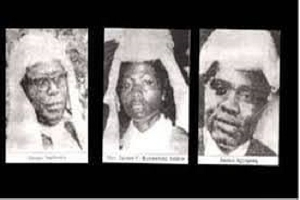 Justice Fred Poku Sarkodie, Justice Cecilia Koranteng, and Justice Agyapong were murdered in 1982
Justice Fred Poku Sarkodie, Justice Cecilia Koranteng, and Justice Agyapong were murdered in 1982
Forty-two years ago, on Thursday, July 1, 1982, which coincidentally marked the 22nd anniversary of Ghana’s republic status, the Ghana Broadcasting Corporation reported a seemingly routine news item. The report stated that judges were to be provided with armed security for their protection.
This news did not make much impact initially, as not even the most skeptical Ghanaian suspected the horrifying events that had transpired.
It later emerged that the story behind the news was horrifying. It was announced that three High Court Judges, Justice Fred Poku Sarkodie, Mrs. Cecilia Koranteng-Addow, and Justice Kwadwo Agyei Agyapong, along with Major Acquah, a retired army officer, had been brutally and savagely murdered on the night of their separate abductions.
The crime occurred at the Bundase Military Range in the Accra Plains. Reports indicated that these individuals had been soaked with petrol and set ablaze. However, a heavy downpour that night doused the fire, leaving their bodies in a state of decomposition.
The nation was stunned by this development, and the act was openly condemned by the public. Subsequently, pressure mounted on the then military government for a thorough investigation and punishment for the perpetrators.
The Provisional National Defence Council (PNDC) publicly declared itself horrified by the crime and, yielding to public pressure, appointed a Special Investigations Board headed by a former Chief Justice of Ghana. The late Justice Samuel Crabbe was appointed chairman to investigate the murder, assisted by the late Chief Superintendent of Police, Jacob Jebuni Yidana.
Findings:
The Special Investigations Board made several findings that led to the prosecution of Joachim Amartey Kwei, a member of the PNDC, Lance Corporals Samuel Amedeka and Michael Senyah, and two ex-soldiers, Johnny Deandu and Tony Tekpor.
During the trial, Lance Corporal Amedeka, Deandu, and Tekpor escaped in a jail break. While Amedeka fled the country, Deandu and Tekpor were captured and rejoined the trial. All accused persons were found guilty and sentenced to death.
Lance Corporal Amedeka was sentenced in absentia. Though Lance Corporal Tekpor was also convicted, he was not available to face the penalty because it was alleged that some days before his trial concluded, another public tribunal found him guilty of acts committed during the jailbreak, and he had been executed.
The three high court judges died in the line of duty to their nation, their countrymen, and the rule of law for a just society.
Every year, these martyrs of the rule of law are celebrated by the Bar, the Bench, and the people of Ghana.
Today, their monuments stand in the forecourt of the Supreme Court, serving as a constant reminder of the good qualities required of a judge and as public servants.
JAB/OGB
Catch up on this week's episode of The Lowdown on GhanaWeb TV as we discussed the topic, Medical Confidentiality. Watch the video below:
Ghana’s leading digital news platform, GhanaWeb, in conjunction with the Korle-Bu Teaching Hospital, is embarking on an aggressive campaign which is geared towards ensuring that parliament passes comprehensive legislation to guide organ harvesting, organ donation, and organ transplantation in the country.